Are you trying to do keyword research without spending a small fortune? You know SEO matters, and keyword research is an important part of it, but every “expert” seems to recommend expensive tools that cost more than your monthly coffee budget. I personally spend several hundred dollars each month on SEO tools, but if you’re trying to DIY and plan on only using those tools occasionally, you probably don’t want to do that.
Well, I have good news for you! You don’t need to spend hundreds of dollars a month on fancy keyword research software to start ranking higher in search results. Some of the most powerful tools are completely free. The secret isn’t having the most expensive tools; it’s knowing how to use the right ones effectively.
Why Keyword Research Actually Matters (And Why Free Tools Can Work)
Before we dive into the tools, let’s get clear on why keyword research isn’t just marketing fluff, even in 2025. When someone searches for what you offer, they’re typing specific words into Google. If your website doesn’t include those words (or variations of them), Google has no idea you’re the perfect solution they’re looking for.
Think about it this way: if you run a pet grooming business and someone searches for “dog grooming near me,” but your website only mentions “canine beauty services,” Google might completely miss the connection. That potential client ends up booking with your competitor instead, not because they offer better service, but because they spoke Google’s language.
Granted, in the era of AI, search engines (and AI tools) are getting smarter and better able to connect the dots between the words on your website and the words people are using to search, even if they don’t match. But why not just make the search engine and AI tools jobs easier, and put the dang words in the content?
In this post, I’ll cover the best free and affordable keyword research tools, including:
- Google Keyword Planner
- Google Autocomplete
- Google People Also Ask
- Google Trends
- Answer the Public
- Ubersuggest
Let’s get into it!
Google Keyword Planner: Your Free Starting Point
Google Keyword Planner is hands-down the best free keyword research tool because it gives you data straight from the source. Yes, you’ll need a free Google Ads account to access it, but you don’t have to run any ads or spend money.
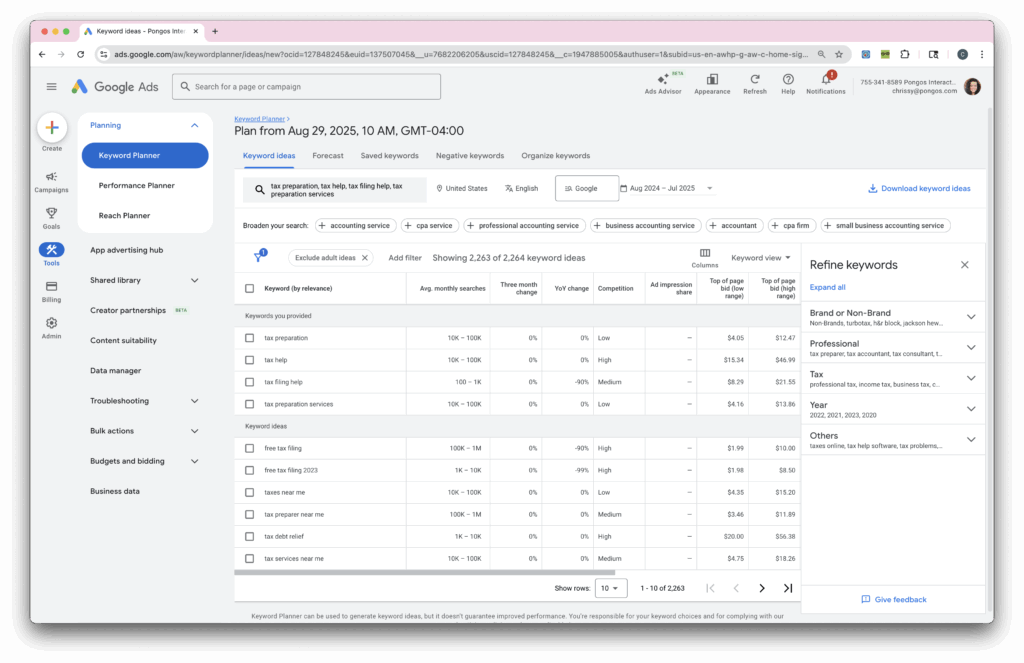
Here’s what makes it powerful: Google shows you exactly how many people search for specific terms each month, plus suggests related keywords you might not have thought of. For example, if I were helping an accountant do keyword research, I could see that “tax preparation services” gets a lot more searches than “tax filing help.”
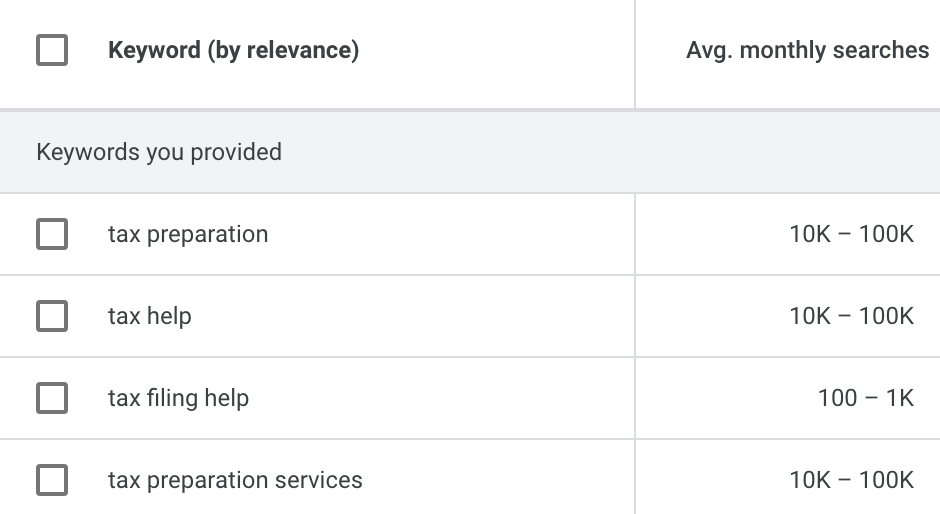
You can also use Keyword Planner to check out your competition by starting with their website URL instead of keywords. Just enter a competitor’s website, and Google will show you what keywords they’re using. This can give you insight into gaps in your own content strategy.
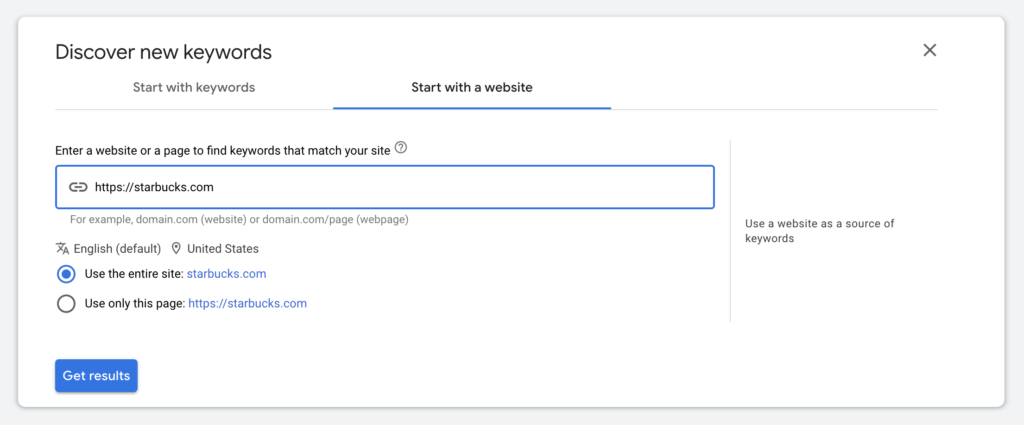
Another great feature of the Keyword Planner is the ability to focus on a specific location for your research. For example, if I’m doing research for a locally-owned coffee shop, they probably don’t really need to know how many searches there were for “espresso” nationwide. But it sure might be useful to know how many searches there were in their county.
How to use Keyword Planner effectively: Start with broad terms related to your business, then drill down into more specific phrases. If you’re a personal trainer, don’t just search for “fitness.” Try “personal training for beginners,” “home workout plans,” or “strength training for women.”
Google Autocomplete: The Searcher’s Mind Reader
This one’s so simple it feels like cheating, but Google’s autocomplete suggestions are pure keyword gold. When you start typing in Google’s search box, those dropdown suggestions show you exactly what real people are searching for right now.
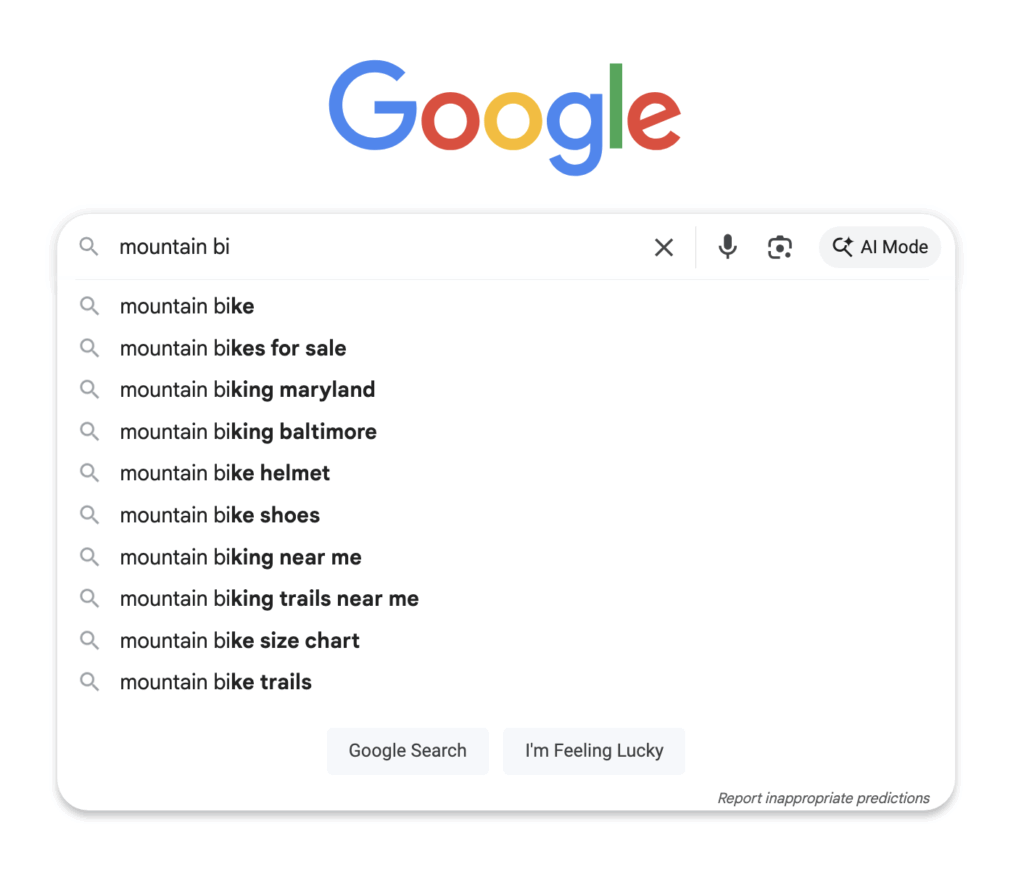
I love this method because it reveals the actual questions and concerns your potential clients have. Instead of guessing what they want, you’re seeing their search behavior in real-time. Start typing your main service or product, then add letters like “a,” “b,” “c” to see different variations.
Make a list of keywords you find using this method and then plug them into the Keyword Planner to see how many searches they get.
People Also Ask: Your Content Goldmine
Depending on what you search for, you might see a “People Also Ask” box in the search results. It will include a list of 5 questions people have asked Google about the topic you’re searching for. Those questions can not only give you keyword ideas, but also ideas for questions you can answer with your blog. People are obviously looking for an answer, so give them one with your content!
When I searched “small business accounting” recently, Google showed me questions like “What accounting is needed for a small business?” and “How much should an accountant cost for a small business?” Each of those questions could become a valuable blog post that helps me get found by business owners with those exact concerns.
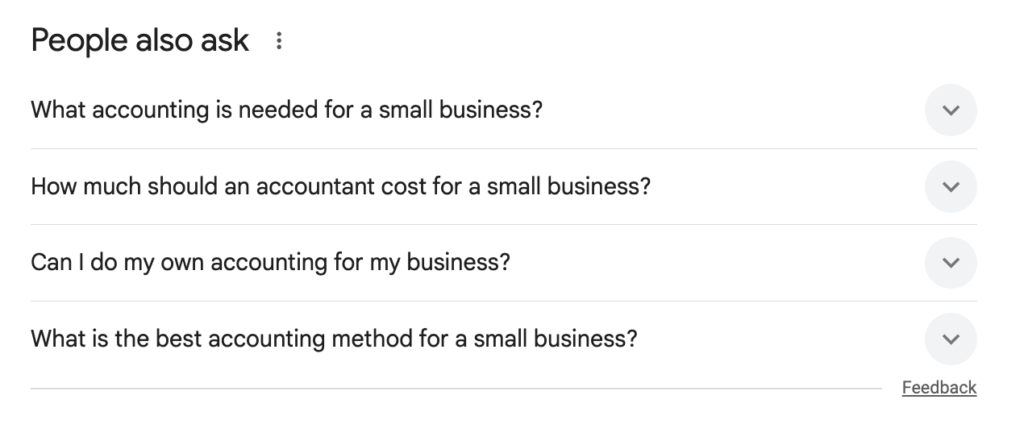
One thing to note about this feature, when you expand one of the answers, Google will give you a few more questions. Try it out!
After you find some keywords with the People Also Ask feature, plug them into the Keyword Planner to see how they stack up.
Google Trends: Timing and Seasonal Insights
Google Trends doesn’t give you specific search volumes, but it shows you whether interest in a topic is growing, declining, or seasonal. This is incredibly valuable for planning content and understanding when to focus on certain keywords.
For instance, if you’re a landscaper, Google Trends will show you that searches for “lawn care services” spike dramatically from March through October, then drop off in winter. Armed with this knowledge, you can plan your SEO content strategy around these patterns.
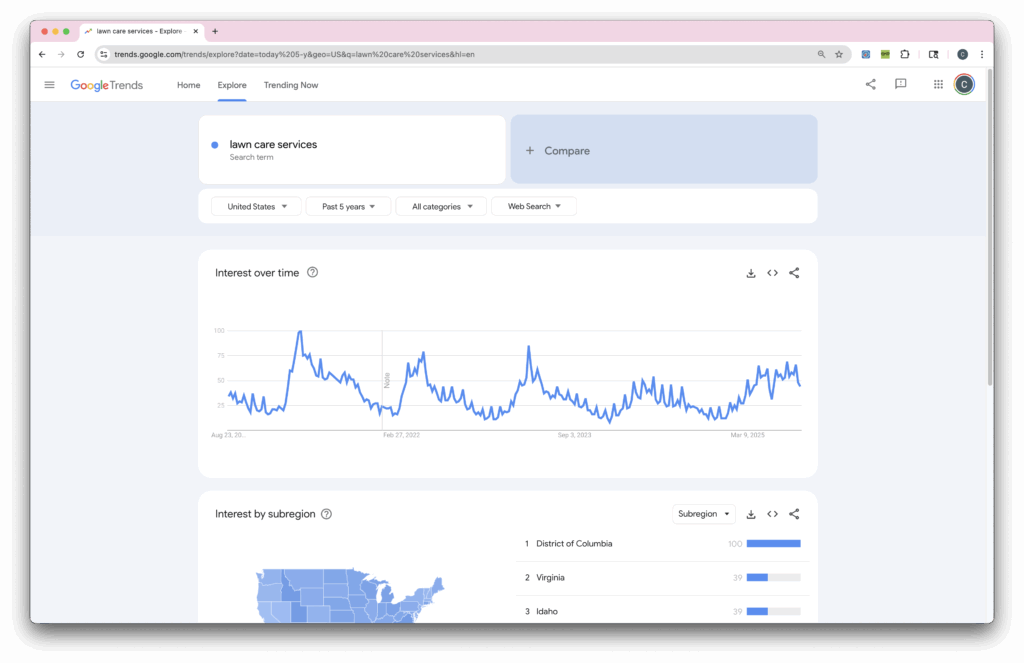
Answer the Public: Questions Your Customers Are Actually Asking
Answer the Public takes your main keyword and shows you every question people are asking about it, organized in a visual web. It’s like getting inside your potential customers’ heads and seeing exactly what keeps them up at night.
It works kind of like Google’s People Also Ask Feature, but with a lot more questions and a much nicer interface. For example, if you search for “dog training”, you’ll see that people are asking questions like, “are dog training clickers good?” and “what does dog training cost?”
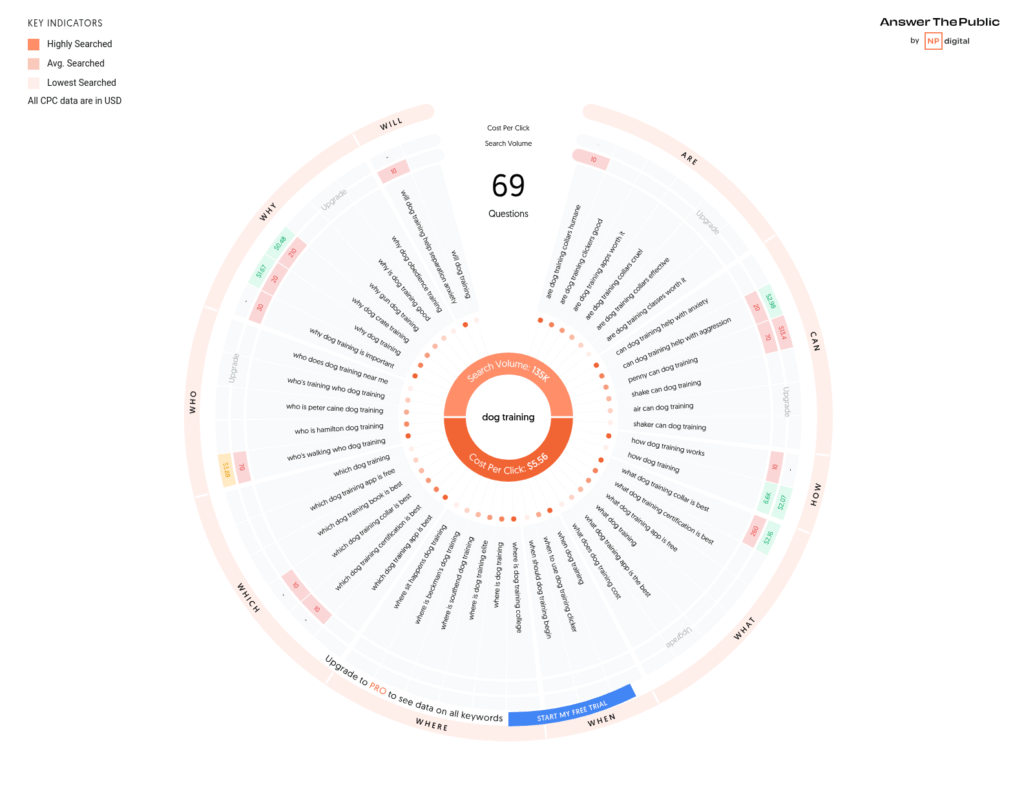
The free version gives you three searches per day. If you love the tool, the Individual plan is priced great for folks who are DIYing their SEO. It’s currently only $119 for lifetime access, which gives you 100 searches per day.
Ubersuggest: Get Keyword Insights
Ubersuggest, which is another tool from the creator of Answer the Public (Neil Patel), offers a generous free tier that includes keyword suggestions, search volume estimates, and even basic competitor analysis. You’ll get three searches per day, but it’s more than enough to get started. As with Answer the Public, they offer a modestly priced Individual plan, which is currently $290.
What I love about Ubersuggest is how it shows you the difficulty score for ranking for each keyword. This helps you focus on terms you can actually rank for instead of trying to compete with huge companies for impossibly competitive phrases.
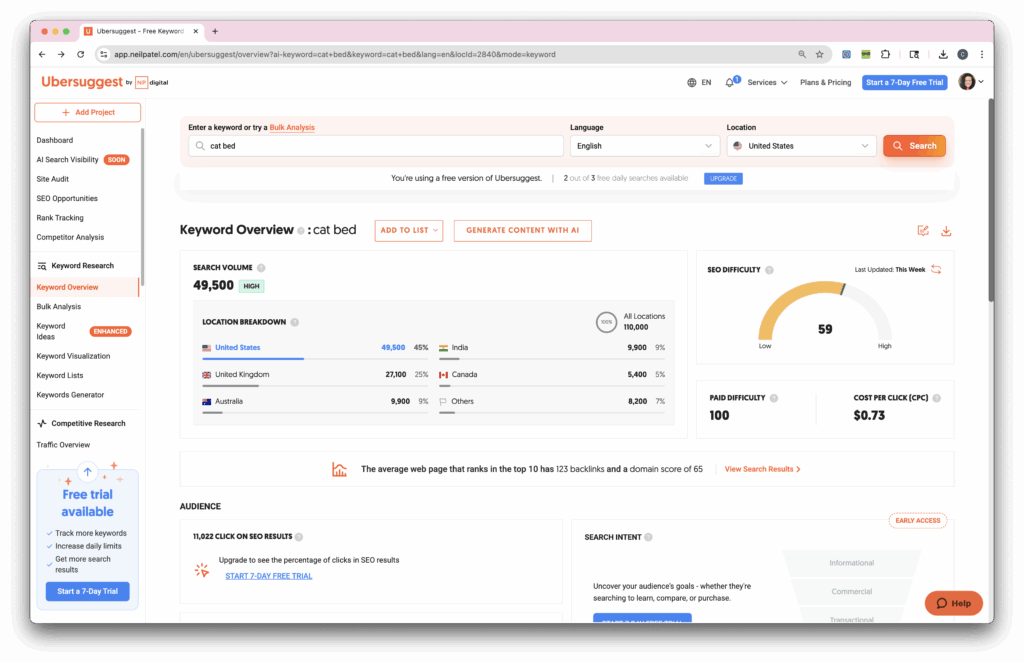
Making Your Keywords Work for Your Business
Once you’ve found your keywords, the real work begins: creating content that helps both search engines and real humans. Google’s gotten incredibly sophisticated! They can tell the difference between content written for robots and content written for people. You want to write for people, but make it so the robots can still understand.
Focus on creating genuinely helpful content that uses your keywords naturally. If you’re writing about “home organization tips,” don’t just stuff that phrase into every paragraph. Instead, write comprehensive, useful content about home organization and let the keywords flow naturally throughout.
Remember, the goal isn’t just to rank higher in search results; it’s to attract the right people to your website and turn them into clients or customers. The best keyword research in the world won’t help if your content doesn’t serve your audience’s actual needs.
Frequently Asked Questions About Free Keyword Research Tools
Yes, but you don’t have to spend any money or run ads. Just create a free Google Ads account, and you’ll have access to Keyword Planner. Google requires this because they want to ensure the data goes to people who might eventually advertise with them, but there’s no obligation to actually run campaigns.
Free tools can definitely get you started, and many small businesses see great results using only free options. Paid tools offer more data, competitor insights, and convenience features, but they’re not required for success. Start with free tools, learn what works for your business, then consider upgrading if you need more advanced features.
Free tools typically give you limited daily searches, less detailed competitor data, and smaller keyword suggestion lists. For example, Ubersuggest’s free version might show you 10 keyword ideas while the paid version shows 100+. However, these limitations usually aren’t a problem when you’re starting out. You can get plenty of valuable data to plan your first 6 months of content with free tools alone.
Absolutely! Many successful small businesses rely entirely on free tools. The key is being strategic about how you use them. Combine Google Keyword Planner for search volume data, Answer the Public for content ideas, and Google Trends for timing. That’s a powerful combination that costs nothing. You might work a bit slower than someone with premium tools, but you’ll definitely get results if you’re consistent.
Your Next Steps to Better SEO
You don’t need expensive tools to start improving your SEO today. Pick one free tool from this list (I recommend starting with Google Keyword Planner) and research five keywords related to your business. Then, find a question to answer using People Also Ask or Answer the Public, and create one piece of helpful content that naturally includes those keywords and answers the question.
The key is consistent action over perfect strategy. I’d rather see you research five keywords and create one optimized blog post than spend weeks analyzing hundreds of keywords without taking action.
If you’re feeling overwhelmed by all the SEO possibilities (been there!), remember that you don’t have to figure this out alone. The SEO Success Club gives you step-by-step guidance, templates, and support from other business owners who are working toward the same goals. You’ll learn how to use these tools effectively without getting lost in the technical details.
The bottom line? Free and inexpensive keyword research tools can absolutely help you compete with bigger businesses and get found by your ideal clients. The secret is choosing the right tools for your needs and using them consistently, not perfectly.
